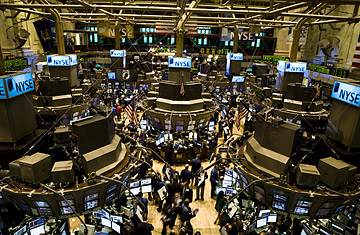
Traders work on the floor of the New York Stock Exchange in New York.
How bad are things on Wall Street? On the day after the day Lehman Bros. died, the Dow Jones average fell 504.48 points, to 10,917.51, its lowest close since 2006, while the S&P 500 dropped 58.74, to 1,192.96. The S&P decline worked out to 4.69%, the worst percentage fall since the day markets reopened after the Sept. 11, 2001, terrorist attacks, but nowhere near the severity of the crashes of 1987 or 1929.
Indeed, things could be worse. No other financial firms have expired, and even Lehman itself seems almost alive as its executives seek buyers for some of its more viable parts. Overall, there is plenty of bad news — but so far it's not a catastrophe.
And while the stock market is a handy economic gauge, what we're really caught in now is a credit market crisis, and it is on the credit side that things are really happening.
The focus now is on the insurance giant AIG, where fears are that losses in real estate investments will spark a credit-rating downgrade that could lead to the firm's unraveling. On Sunday AIG reportedly asked the Federal Reserve for a $40 billion bridge loan to tide it over. On Monday the firm initially got a special dispensation from the governor of New York, the state that regulates it, to tap $20 billion in capital from its subsidiaries. Then it paid a visit to the Federal Reserve Bank of New York, where President Tim Geithner turned down its loan request but, according to the Wall Street Journal, asked Goldman Sachs and Lehman Bros. to organize a $70-billion to $75-billion rescue loan. There's no word yet on whether they'll actually do it, which means AIG's woes are likely to ripple through the market for some time.
The week is sure to be volatile, even as our captains of industry try their best to keep the faith. The CEOs of Bank of America and Merrill Lynch held a joint press conference to discuss in upbeat tones B of A's planned takeover of Merrill, while Treasury Secretary Hank Paulson held a press conference to tell Americans they should remain confident in the "soundness and resilience in the American financial system."
Should we be confident? Lehman's first day in Chapter 11 bankruptcy actually held some encouraging signs, as markets avoided chaos and the company itself appeared close to selling its asset management arm to a private equity firm. There were also reports that Barclays, which had decided over the weekend not to bid for Lehman as a whole, might still be interested in buying the core of Lehman's business, its broker-dealer operation.
But the big question remains whether, as Lehman begins the forced selling of its more troubled assets, that will drive prices for some real estate securities down so far that other firms land in trouble as well. Merrill Lynch North American economist David Rosenberg predicts that Lehman's demise will begin a long, painful process of unraveling trillions of dollars in derivatives "to identify how big the potential losses are and where they are being held."
In other words, this craziness isn't likely to end soon. The fact that markets kept functioning pretty smoothly Monday marked something of a minor triumph for American financial capitalism. But it was just one day.
